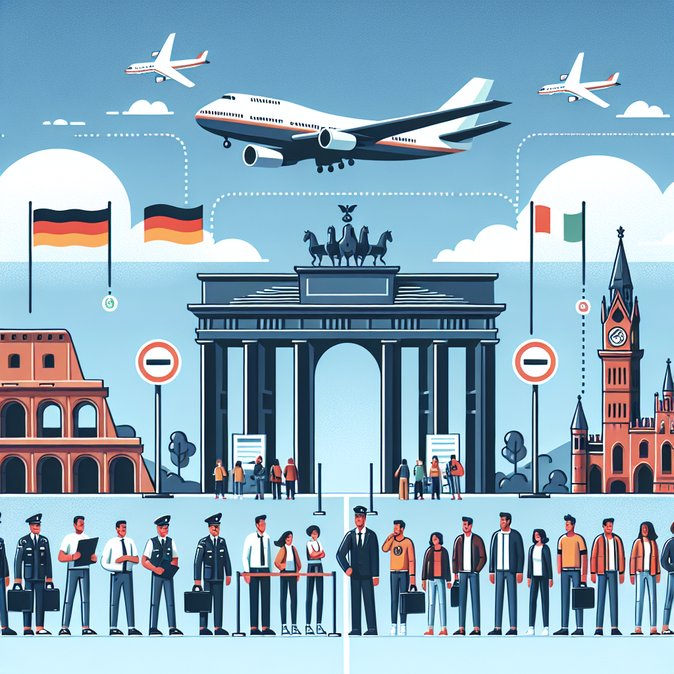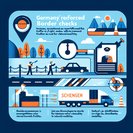
German travellers heading to Italy on 4 November woke up to an unfamiliar routine: Schengen‐internal border checks. In an official notification to the European Commission, Rome re-introduced controls at land crossings with Austria and Switzerland and—crucially for Germany—at Italian airports handling flights from German cities. The measure ran from 3 November 00:00 to 4 November 24:00 and was justified by Italian authorities as a “proportionate response” to security risks surrounding the UEFA Champions League tie between Napoli and Eintracht Frankfurt scheduled for 18:45 on match-day.
Background. Since 2015 the Schengen Borders Code has allowed member states to revive internal checks for short periods when public order is threatened. Over the past two years football fixtures have frequently triggered such re-introductions, but this was the first time in 2025 that controls specifically targeted flights from Germany. Napoli–Frankfurt matches have a history of fan violence; 2023 clashes in Naples resulted in dozens of arrests and property damage, prompting local officials to demand tighter screening of incoming supporters.
![Italy’s One-Day Border Controls Disrupt German Travel for Napoli-Frankfurt Champions League Match]()
What happened on the ground. Airlines operating Germany–Italy routes were asked to verify passenger identities against watch-lists before boarding; Lufthansa and ITA Airways told corporate clients to allow at least 45 minutes of additional time at departure gates. At Milan Malpensa, travellers arriving from Frankfurt and Munich reported passport scans and random bag inspections by the Polizia di Stato—measures normally reserved for non-Schengen flights. No serious back-ups were recorded, but several German executives connecting onward to Asia missed their slots after walking distance between Schengen and non-Schengen zones lengthened journeys.
Business implications. Although the controls lasted only 24 hours, they highlight a growing trend: sports-related security fears are now shaping the border-management calendar. Mobility managers were reminded that ‘soft’ Schengen borders can harden overnight, with potential knock-on costs for time-sensitive cargo, duty-trip itineraries and assignee relocations. Travel‐risk specialists advise adding buffer time to November’s remaining high-profile fixtures—including the Stuttgart-based UEFA Youth League—because further pop-up controls cannot be ruled out.
Practical advice. Companies should: 1) brief employees to carry either a passport or national ID card even on intra-EU flights; 2) review A1 certificates and posted-worker notifications, as inspections often broaden to labour-law compliance; 3) keep an eye on the Commission’s “Temporary Reintroduction of Border Control” portal, which posts updates in real time. Mobility teams whose staff were delayed can claim compensation under EU261 only if airlines failed to provide accurate pre-flight information, a high bar given the public notice issued on 31 October.
Background. Since 2015 the Schengen Borders Code has allowed member states to revive internal checks for short periods when public order is threatened. Over the past two years football fixtures have frequently triggered such re-introductions, but this was the first time in 2025 that controls specifically targeted flights from Germany. Napoli–Frankfurt matches have a history of fan violence; 2023 clashes in Naples resulted in dozens of arrests and property damage, prompting local officials to demand tighter screening of incoming supporters.

What happened on the ground. Airlines operating Germany–Italy routes were asked to verify passenger identities against watch-lists before boarding; Lufthansa and ITA Airways told corporate clients to allow at least 45 minutes of additional time at departure gates. At Milan Malpensa, travellers arriving from Frankfurt and Munich reported passport scans and random bag inspections by the Polizia di Stato—measures normally reserved for non-Schengen flights. No serious back-ups were recorded, but several German executives connecting onward to Asia missed their slots after walking distance between Schengen and non-Schengen zones lengthened journeys.
Business implications. Although the controls lasted only 24 hours, they highlight a growing trend: sports-related security fears are now shaping the border-management calendar. Mobility managers were reminded that ‘soft’ Schengen borders can harden overnight, with potential knock-on costs for time-sensitive cargo, duty-trip itineraries and assignee relocations. Travel‐risk specialists advise adding buffer time to November’s remaining high-profile fixtures—including the Stuttgart-based UEFA Youth League—because further pop-up controls cannot be ruled out.
Practical advice. Companies should: 1) brief employees to carry either a passport or national ID card even on intra-EU flights; 2) review A1 certificates and posted-worker notifications, as inspections often broaden to labour-law compliance; 3) keep an eye on the Commission’s “Temporary Reintroduction of Border Control” portal, which posts updates in real time. Mobility teams whose staff were delayed can claim compensation under EU261 only if airlines failed to provide accurate pre-flight information, a high bar given the public notice issued on 31 October.










